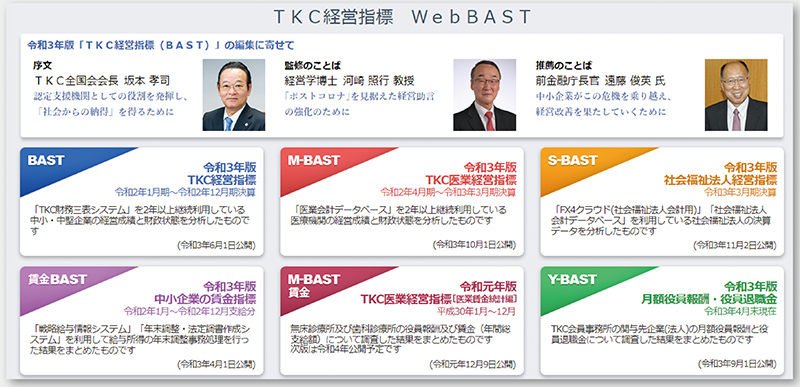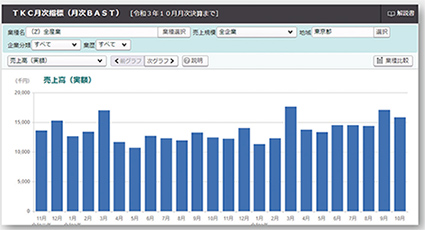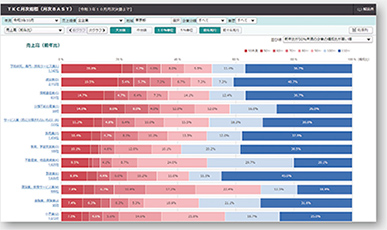Approaches Made by the Operation Departments
Achieve High Value-added Network Services by Leveraging the Strength of Central Processing
One of the strengths of TKC is the capability to process a massive amount of data using large-sized computers that it has continued to develop since its founding. We have worked to establish the functions needed to provide various network services as though we had anticipated "cloud computing" before its time.
Today, our two operation departments, the TKC Consolidated Information Centers (nine locations nation-wide) tending to TKC member firms and the System Operation Department in charge of local governments undertake this role.
For these operation departments to run smoothly, it is crucial to secure highly advanced information security and achieve continuous evolution of the system environment by utilizing the latest ICT.
As for information securities, TKC acquired certification under international standard ISO27001 for the information security management system (ISMS) to ensure the confidentiality, integrity and availability of our information.
Note that, in 2014, we completed a full transition to online, real-time processing on Windows Server.
TKC Consolidated Information Centers
The strength of the Accounting Firm Business Division is the TKC Financial Accounting System which fully complies with laws and regulations. The Consolidated Information Centers are dedicated to information processing services.
The Centers collaborate with the TKC Internet Service Center (TISC) to provide TKC members with the newest accounting information that reflects their account balance, which is constantly updated on a real-time basis. Even in the event of a large-scale disaster, the Centers are equipped with a mechanism to take over the functions of the affected Center, thus allowing to continue providing the services.
System Operation Department
The forte of the Local Governments Business Division is the TASK Cloud services provided from TKC’s Data Centers as the service base, which combine various applications with the TASK Outsourcing Services that support massive batch processing. The System Operation Department is responsible for the TASK Outsourcing Services.
We have developed a new mechanism that meets the demands of the "cloud era" to reduce time and improve the efficiency of tasks from processing of tax notifications and printing of forms to sealing, binding and delivery. With this, we help reduce the operational burden and costs of local governments during the initial taxation period and other peak seasons.

TKC Consolidated Information Center

System Operation Department
[Major facilities]
Printing capabilities shown in ( )
- PS5600 (21,600 lines/min.)
- 24 sets
- PS5230 (8,250 lines/min.)
- 8 sets
- VSP3710 (660 lines/min.)
- 8 sets
- VSP3601 (280 lines/min.)
- 4 sets
As of January 1, 2022
■ TKC Management Indicators (BAST)
The financial accounting data accumulated at the TKC Internet Service Center is utilized in editing the TKC Management Indicators (BAST) issued by the TKC National Federation every year.
BAST contains analysis on the performance and financial standing of SMEs (with annual turnover of 10 billion yen or less) which have used TKC’s Financial Statements System or similar systems continuously for more than 2 years. BAST attains a remarkable repu-tation from financial institutions and other organizations as highly accurate, high speed management indicators on SMEs not matched by any other indicator.
In addition, TKC provides the TKC Medical Institutions Management Indicators (M-BAST), TKC Social Welfare Corporation Management Indicators (S-BAST), Wage Indicators for SMEs (Wage BAST) and the Monthly Remunerations for Officers/Retirement Allowance for Officers (Y-BAST).

■ TKC Monthly Indicators (Monthly BAST)
In April 2021, TKC began offering TKC Monthly Indicators (Monthly BAST). Monthly BAST is a statistical summary based on the latest monthly settlement data from over 250,000 SMEs that are clients of TKC Members. It enables a rapid understanding of trends in local economies.
●Feature 1 Created from approximately 250,000 companies (one-tenth-scale model of the Japanese economy)
Monthly BAST is created from the monthly settlement data of approximately 250,000 companies that use TKC systems for accounting and tax return processes. It is said that there are approximately 2.7 million companies in Japan; as such, Monthly BAST can be called a “one-tenth-scale model of the Japanese economy.”
●Feature 2 Covers all 99 major groups designated by the Japan Standard Industrial Classification, with annual turnovers between 5 million and 10 billion yen
Monthly BAST enables each of the 99 major groups designated by the Japan Standard Industrial Classification to be viewed by sales volume, prefecture, and industrial history. Comparisons between industries can also be made.
Aggregation results are not displayed if a chosen prefecture or industry type brings up less than three companies for aggregation. This is to mitigate the influence of certain companies, and to ensure that Monthly BAST is a statistical summary that demonstrates the actual state of local economies.


● Monthly BAST aggregates monthly settlement data on the 25th of each month, then releases this data on the 30th of the same month; it includes monthly settlement data from up to two months prior to the month of aggregation.